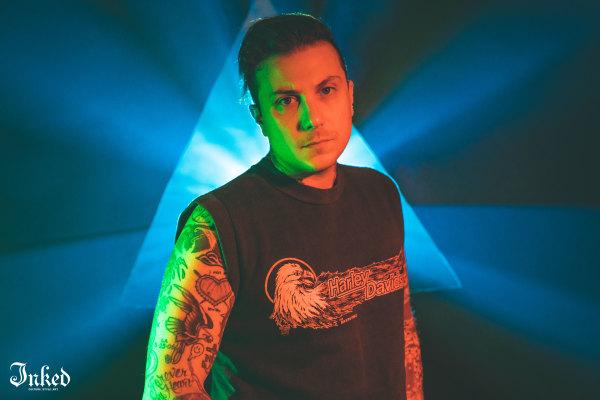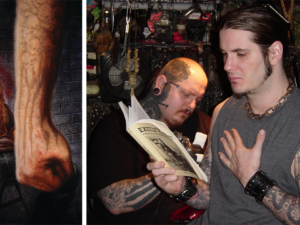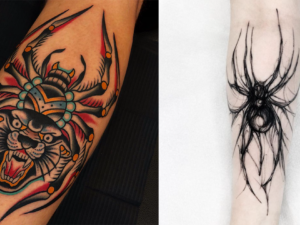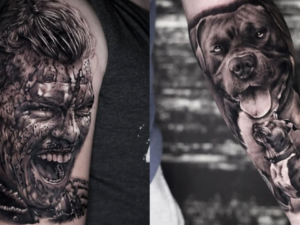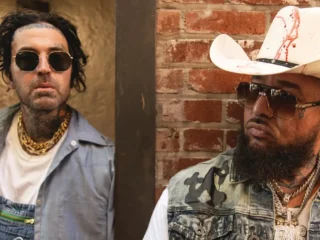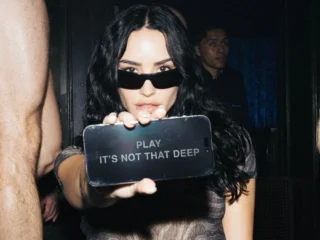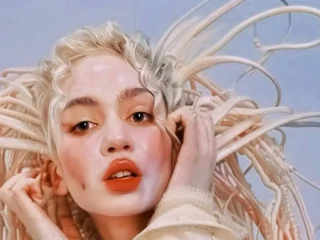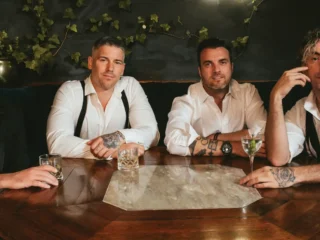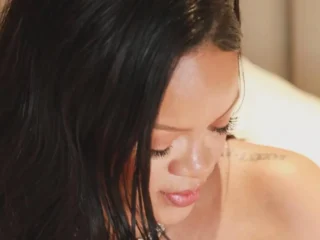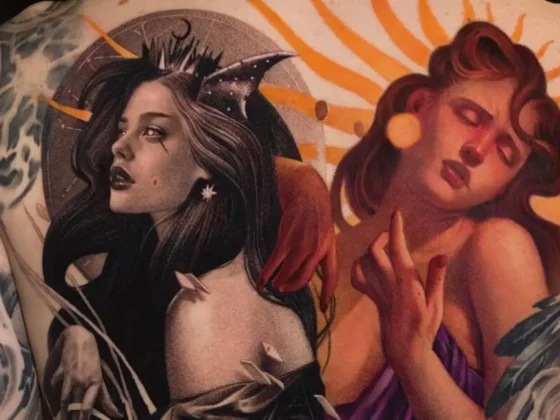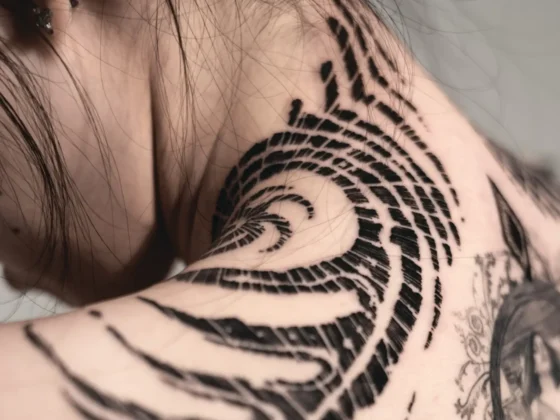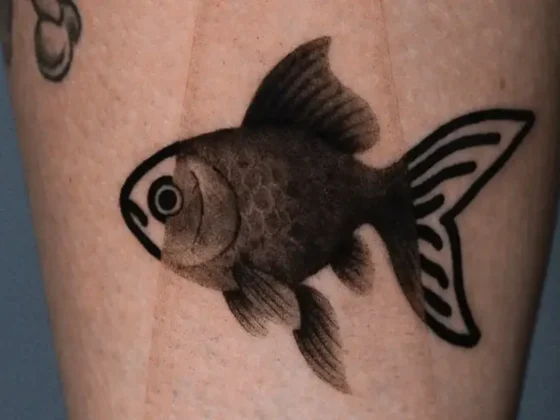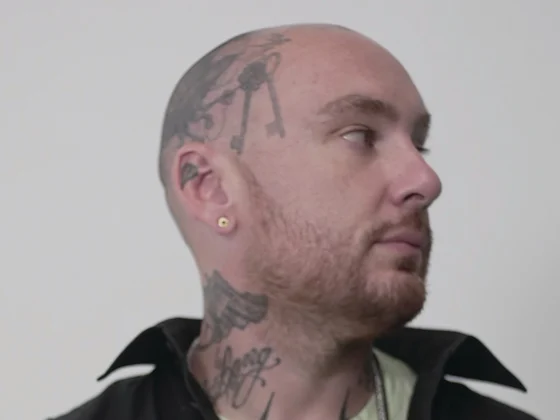Inked Mag
May 31st, 2019
Frank Iero and The Future Violents Talk New Record, Barriers, and The Significance Behind Their Band Name
"Party Dad" Frank Iero tells INKED about the barriers The Future Violents have had to break through to complete their newest album, how fatherhood is like Infinity War, and team bonding with FIATFV tattoos.
Recorded and mixed by audio-engineer legend Steve Albini, Frank Iero and The Future Violents have released their newest record, Barriers, via UNFD. FIATFV, previously known as Frank Iero and The Patience, features longtime collaborator Evan Nestor on guitar, Murder By Death’s Matt Armstrong on bass, Thursday’s Tucker Rule on drums, and The Mermaid’s Kayleigh Goldsworthy on piano, organ, and violin.
For a band whose name is forever changing and evolving– yet growing together– their discography follows suit.
As Frank, our favorite “party dad,” tries to allocate who is the “mom” and “dad” in terms of music inspirations for Frank Iero and The Future Violents, Iero notes that there is definitely a “‘70s-rock theme careening through.” Nestor sums up The Future Violents’ “musical parents” as: “Dad is a ‘70s rock hero, and mom is real sad about it.”

The Future Violents’ roster is Frank’s “dream lineup.” When Thursday signed to Eyeball Records, where Frank Iero (the “I” in Iero pronounced like the “eye” in Eyeball Records) was signed with his band at the time, Pencey Prep, he met Tucker Rule. Fortuitously, the same with Matt Armstrong, when Murder by Death signed. Frank knew Evan Nestor since he was 15-years old, and ended up marrying his sister. Nestor had opened for My Chemical Romance a couple times “back in the day,” and Frank said, “When he was of age I was immediately like, ‘Yeah I’m taking him on tour.’”
Frank, you wrote the songs on Barriers with these specific musicians in mind?
Frank Iero: It actually goes back 19 or 20 years. With my past band, Pencey Prep, we’d hang out at parties and we’d get to see Thursday play. At the time, Thursday was really on the rise and the biggest band going. A real hometown hero kind of thing. We’d see them playing and go, ‘Oh my God, they’re so good.’ They were the tightest band that maybe I’d ever seen. Seeing Tucker and the way that he played, and the way that he wrote music – and thought about it melodically – he would write hooks on your arms. I remember thinking, ‘Oh man, I’d really like to get to play with them.’
When Thursday was touring we met a band called Little Joe Gould, [which they ended up changing their name to Murder by Death.] When I saw Matt Armstrong I thought, ‘Wow, he’s just on a different wavelength’ in the way that he thinks about constructing parts that he’s playing. It’s not just following a guitar line, he creates soundscapes and thinks about music in a different way. I thought, ‘How cool it would be to have a band with him.’
Those two guys, we stayed friends and in contact for 20 years, and we always talked about how it would be great to do a project together. Flash forward to two years ago, I met Kayleigh Goldsworthy. She is a multi-instrumentalist; she plays piano, organ, mandolin, guitar, violin, and sings beautifully. She’s unreal. I always wanted a female component to one of my bands and I always thought it would be really great to have that timber of voice. When I met her I was like, ‘Oh man, she’s a real musician on another level.’ We ended up covering R.E.M.’s “Losing My Religion” together at the BBC. It was one of my favorite sessions I’ve ever done there. I kept thinking, ‘Man, I would do anything to get her into one of our bands.’
“It just so happened that at the beginning of last year, all these people were free. It felt like the stars were aligning… that shit never happens. So I had to do it.”

The band name changes every time. How did you settle on The Future Violents?
My thing is I really enjoy the honeymoon period of where you name the band, figure out what it’s going to sound like, and the aesthetic behind it. So when it came time for me to do quote, unquote the ‘solo thing,’ I was like, ‘I’m just gonna change it every time.’ That way there are no rules. *Laughing* Since it does change, I figure if I keep my name in the front end of it, it shouldn’t be as confusing.
But for FIATFV, it was kind of serendipitous. I was already looking for names and on our flight from Perth to Sydney – on the fateful Australia tour where we had this horrible accident about three years ago – a steward came over and was like, ‘You guys look like you’re in a band,’ and I said, ‘Yeah we are Frank Iero and The Patience.’ He misheard and said, ‘The Future Violents, that’s a crazy name.’ And I was like, ‘No, that’s an amazing name. I’m writing that down.’
I hid it away at the time and didn’t know what it really meant. And then all of a sudden we got hit by a bus in Sydney and couldn’t tour, which kind of knocked everybody out of commission. So this project made me think about that moment, and what that collection of words meant. I thought about how life for us changed so abruptly and so violently, and how that was a real, active participant.
It’s almost like, life is this pristine lake. And you could sit there passively and live vicariously through other things around you. You know, just watch the wind take the tide and watch the fish swimming underneath and never participate in it. Where as you can pick a rock up off of the shore and toss it in, and just disrupt everything. How violent an action that is – and I don’t mean that in a negative way, I mean in a leaving-a-footprint kind of thing.

How did that accident contribute to the creation of Barriers?
I feel like it’s human nature to kind of set up these walls; whether it be for protection or perceived protection. Sometimes our biggest fear is to fail, so we come up with these reasons why we can’t attempt things in order to protect ourselves from that fall. But I think that that’s the worst thing that we can do, because we think we’re keeping other people out, but really what we’re doing is we’re keeping ourselves in, you know?
The biggest barrier for me was that we were in this unfortunate accident. I knew I had this huge elephant in the room, like this life changing event that just seeped into my DNA. I felt like a completely different person because of this thing that happened. And now this is the first record since that occurrence, and I kept looking over my shoulder at this giant dark cloud and being like, ‘I have to address this. There’s no way I can’t address it.’ But everything I said didn’t feel powerful enough, or it didn’t encompass all of the emotions that it had inside about that event. So I put it off because I thought, ‘Maybe I don’t know how to do this anymore. Maybe this is just too big and I can’t move forward from it. ‘
“And then we’re talking about these musicians, these people that I’ve wanted to be in a band with for 20 years telling me, ‘Hey, now’s the time you can do it.’ And I thought to myself, ‘How stupid to miss out on this opportunity because I can’t address this and deal with my shit?’ And that was my wall. That was my barrier.”
So I started to chip away at it and as I did, other things started to seem not so bad and the topics didn’t seem so treacherous to deal with. This record is very much about tearing down those walls that we build up for ourselves, and hopefully you can hear me dealing with these fears and obstacles head on. Hopefully it inspires you to be and to do the stuff that scares you.

Matt: For me, Barriers has to do with having a fresh start in a lot of ways. New band, new lease on life, that kind of thing. Having a new record come out with a new band at age 39, I don’t know if I’d have believed that was going to happen if you told me that a few years ago.
Tucker: This album signifies that you have to work hard to get anything in this life. A large barrier for me was quitting drinking/partying. I’m a year-and-a-half sober. I was pretty worried that touring wouldn’t be fun without the post-show cocktails. Turns out that playing music with my friends, playing my best, my health, and my family has made me a happier person.
Kayleigh: Life is a constant struggle to assess and break down barriers in your life. I think more recently, I’ve realized the barrier that social media places on the appearance of your life, versus what your life actually is. It’s imperative everyone knows that: yes, sometimes life is beautiful and happy, and we’re always first to broadcast that. But it also can be really difficult and arduous, though we have a tendency to leave that out.
There’s also an internal barrier within the band that Frank Iero and The Future Violents break down with ease. How does a band with a roster of so many different sounds mesh their styles to curate cohesive work?
Evan: It is something we have all talked about in the past, where sometimes the hardest part with playing is when not to play. I feel like everyone in the band knows that, and knows what is best for the song. We all want to have this album sound great and we love all of these songs, but we know it’s something that you just feel, you know? You feel, ‘Okay there should be something extra I should be doing here,’ or ‘I feel like there should just be nothing that I should be doing here.’ That is what gives the song air and roominess, instead of just five people in a room like, ‘Oh my God, we have to just play everything altogether at once.’
This album really does have a great, solid group feel, where no one’s really stepping over each other. Every part kind of has its place.
Frank: I feel like that comes from maturity, you know, realizing maybe the most loudest or most important thing you can say is to just shut up. Picking your moments makes them even more important.

Speaking of a new outlook with maturity, how has fatherhood impacted musician life?
FI: You know, I used to think that private life – what I call real life – didn’t really have anything to do with my creative side. I thought for awhile that I could keep them kind of separate. I’ve realized though that they’re so much more interconnected than I could’ve ever imagined. It’s almost like in Avengers: Infinity War where Vision has that stone in his head and there’s like a trillion nerve endings that are connected to it. And that’s what I feel like. My creative life and my real life have these weird connections, where if you snip one it affects the other in such a weird way.
Mostly, I think about things differently now. With the first song on the record, “A New Day’s Coming,” I kind of tried to model it off of a Stax Records-type song. When my daughters were born, the first songs they heard when they came out of the hospital was really important to me. So I combed through all these songs that I wanted them to hear. I felt the best song to hear on their ride home was “These Arms Of Mine” by Otis Redding, and I wanted to write a song like that for them. I think a song like “A New Day’s Coming” wouldn’t have been there without being a dad first.
You ended up writing “A New Day’s Coming” for them to sing to them at night?
We do this thing at night, we’ll either read a story or do a song, and I would sing sometimes if they want to do a song. We wrote a song together called “Best Friends Forever.” And of course, ultimately, they want another song when you do one. It’s like if you give a mouse a cookie kind of thing. So I was like, ‘Oh man, I don’t have any other good songs.’
“I want to have songs that my kids can look to and find hope in, and not just be like, ‘Oh, that’s about drugs.’”
This idea that no matter what happens during the day, tomorrow’s the next day of the rest of your life. The slate is wiped clean, and you have another chance to kind of dust yourself off and get it right. I thought that was a really good sentiment to start the record with: that the past really doesn’t matter, it’s what you do next.
While the band name changes, your band dynamic remains consistently close-knit. What do FIATFV bond over?
In terms of pre-show rituals, we do a ‘one, two, three’ and put our hands in the middle kind of thing, and you have to say something that happened during the day. It’s usually something that makes us laugh. It could be anything, but it keeps us family. The thing is you don’t want to miss out on the occurrences that happened in the day, otherwise you’re not going to get the joke before the show. *laughing* It’s an important ritual.
Frank Iero and The Future Violents bond over coffee, meme sharing, and snacks. Kayleigh says, “The group chat is very much alive on a daily basis.”
Tucker added, “We rehearse at Frankie’s House. His place is always stocked with Oreos.”
“Once, Tucker’s outfit perfectly matched a box of cookies we were snacking on during rehearsals,” Kayleigh said. “We’re big on food.”
FIATFV also team builds with matching tattoos. While recording in Chicago, the bandmates got matching barbed-wire heart tattoos.
Frank Iero wouldn’t be known as the “party dad” if he only had one tour tattoo. Iero shares the story of his scorpion ink on his neck, from an early My Chemical Romance tour. No, his parents “weren’t super into tattoos.” Yes, his dad would often say, “They just look dirty.”
“We show up at the venue and I took a nap. I had this nightmare where things just didn’t work out. I had to get this regular job and I had to sell my guitars and stuff. It was horrible. When I woke up, I was like, ‘Fuck this I’m never having a backup plan.’ So I collected money from everyone in the band, and it came out to be $43,” Frank recalls. “I walked down the street to a tattoo shop in Richmond, Virginia. I said, ‘I have $43 and I want a scorpion on my neck.’”
Frank added, “I realized later on that the Scorpion actually has four legs on one side and three legs on the other side. Which I think signifies how much money I had? *Laughing* Either way, when I came home, my dad was like, ‘You got a fucking what!?’”
To see tour dates for Frank Iero and The Future Violents, click here.
Editor's Picks
Paul Booth Illustrates Cover for Pantera Graphic Novel
The revered tattoo artist created a cover for a graphic novel celebrating the 30th anniversary of “Vulgar Display of Power”
Scary Spider Tattoos
Spiders are terrifying, yet for some reason people sure do love to get tattoos of them

